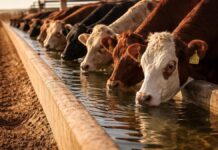
The German feeding technology specialist WEDA Dammann & Westerkamp has supplied a liquid feeding system for the black soldier fly (BSF) to the Portuguese breeder EntoGreen. Founded in 2014 by Daniel Murta, the company produces high-quality animal protein and organic fertilizer from by-products of the agricultural and food industry at its headquarters in Santarém.
Close development cooperation between WEDA and EntoGreen
In the system, the larvae of the BSF are fed with the by-products until they reach their final weight. The WEDA system, including control and process visualization, is a container system with mixing tanks that was specially developed and built for EntoGreen. “We worked closely with our partner WEDA on the design and construction,” emphasizes EntoGreen founder and CEO Daniel Murta.
Tests completed successfully across the board
The feed substrate can be mixed in parallel in the liquid feeding system. The integrated Intrix dosing system ensures an individual combination and precise portioning of the feed substrate in the rearing units. In numerous test runs, even viscous substrates could be dosed and conveyed without any problems. At EntoGreen, the vegetable materials on which the larvae of the black soldier fly thrive consist of regional vegetable by-products that otherwise could not be used as nutritional sources and were lost.
Daily output of 25 tons
“The WEDA plant generates enought vegetable substrates to contribute to a daily larvae output of around 25 tons from regional vegetable by-products. It is easy to scale up for future expansion thanks to its modular design,” explains the responsible WEDA-Export Manager, Gabriel Schmidt. A new plant is already being planned and, according to Gabriel Schmidt, should produce up to 45 tons of live larvae from 2025 with a daily raw material input of 210 tons.
Contributing to the development of the agricultural and food sector
With the help of innovative feeding technologies, EntoGreen can make a strong contribution to the sustainable development of the local agricultural and food sector. In addition, insect production can offer farmers and local stakeholders a variety of opportunities for developing new business models. Above all, however, the challenges of nutrient scarcity and food waste are addressed in a focused and solution-oriented manner by returning by-products from food production back into the value chain on the one hand, and creating a sustainable organic fertilizer and nutritious, natural feed for pets and livestock on the other.







